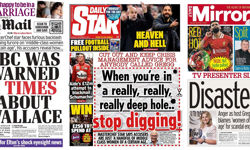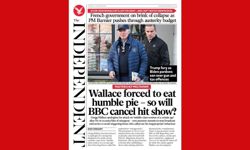Once they had a special relationship. The local newspaper and the local football club were both big players in the community. The newspaper was the main way the club could reach its fans and the paper enjoyed strong sales when the club did well. The Sunday Sun’s sales graph used to rise and fall like the North Sea depending on Newcastle United’s Saturday performance. Evening papers produced a football edition every Saturday. In Manchester, Liverpool, Newcastle, Sunderland, Bristol, Southampton and Norwich, there were Football Pinks. In other cities, including Sheffield, there were Football Greens. Coloured paper was, of course, cheaper. They were essential reading. If you didn’t get home for the 6pm classifieds by James Alexander Gordon, there was no way of finding the full results and tables until the Sunday papers. After the game, fans would hang around the Evening Chronicle’s office, waiting for the Pink to roll off the press. Half a decade on, the relationship is much cooler … and in some cases the once loved-up couple are barely speaking. The breakdown was particularly evident in the North-East where Newcastle United banned the Chronicle, Journal and Sunday Sun for fourteen months after coverage of a fans’ protest.
Banned not Gagged
The Chronicle responded robustly. It published the letter from the club in full and ran a ‘Banned not Gagged’ front page. Editor Darren Thwaites argued the paper's independence and integrity was more important than a cosy relationship. Full marks to the papers for some excellent coverage. During the ban, the journalists simply bought tickets to cover the games. Thwaites said: "We made good use of contacts and signed up new columnists. We concentrated on intelligent analysis, stats and opinion. We actually grew our coverage in print and online and have seen a massive growth in digital audience.”
What Thwaites would really like is a mature relationship: "The kind we'd expect from a local authority. Trust, honesty, good access … but an understanding that we won't always agree with each other. Clubs may be owned by rich, powerful individuals but they will always belong to the fans. That's why we feel we have a duty to represent their position, even if it's sometimes in conflict with the club.” The ban was lifted in December and hopefully common sense will prevail.
Whereas the Newcastle rift has been high-profile - and at the time of writing, The Daily Telegraph remains excluded from St James’s Park after suggesting owner Mike Ashley might sell the club - there have been other fall-outs.
Port Vale banned The Sentinel after it reported fans had not received commemorative shirts. Southampton banned the Daily Echo from taking photographs in St Mary’s and then extended the ban to outside the stadium. The Liverpool Echo has, for short periods, been banned by both Everton and Liverpool. Celtic and Rangers have also banned reporters.
This knee-jerk response comes as no surprise. Those who run big clubs are unlikely to be fierce champions of a free press. Most simply want the media to be an extension of their PR operation. And if newspapers fail to deliver, there is nothing to stop club chairmen stamping their authority and their feet. Channel 4 journalist Alex Thomson has compared this to the same attitude of African despots. In his blog he said: “It’s time clubs who ban journalists were forced to grow up a wee bit – and well past time that football journalism and the FA stood up for the game and not the money and put a stop to this nonsense."
I couldn’t agree more – but the footballing authorities are unlikely to intervene. The Premier League holds regular meetings with the News Media Association but these deal with guidelines inside the grounds. Dan Johnson, the league’s communications director, told me it does not have any jurisdiction on who the clubs allow into their stadiums. Could it be written into the clubs’ contracts with the league? He thinks that would be impossible without a financial factor … and the league does not believe it is practical to charge print journalists. He also pointed out that the majority of clubs have a good relationship with newspapers and are mature enough to deal with the inevitable tensions.
That's true … but without contractual rules by the league, access for newspapers will continue to be on the whim of chairmen and managers.
Personality driven
Liverpool Echo editor Alastair Machray certainly believes the mood set by the manager pervades through the clubs. He said: "We have, for instance, good relations with Roberto Martinez at Everton; he is sophisticated, media-friendly, charming and appreciates the position and value of a local media. David Moyes had little or no time for the press; was rude and unhelpful. He made no distinction between national and local.”
The Nottingham Post had a poor relationship with ex-manager Billy Davies. Editor Mike Sassi said: "There was a single press conference every week, which Davies and his assistant manager snarled their way through begrudgingly. Davies was often particularly aggressive to the Post's Forest reporter. On one memorable occasion he verbally abused a Post photographer during a night match away from home. When I complained, he banned our photographers from the City Ground.”
Since then, Stuart Pearce, a man with a genuine Nottingham heritage, has taken over. Sassi said: "He is always open and accommodating, with both The Post and the fans. The club, as a whole, has also become more open. They have appointed former European Cup-winning captain John McGovern as an ambassador and the players are regularly made available for interview.”
In Stoke, Sentinel sports editor Keith Wales said: "We had excellent links with Tony Pulis. That all changed with the arrival of Mark Hughes, who only talks to the media at his pre and post-match press briefings. We certainly do not have his mobile number, as we did with Pulis.”
That is offset by the club’s multi-millionaire chairman, Peter Coates, who is always available. Sassi, who edited The Sentinel for seven years, said: "Coates is a real Stokie who loved presenting prizes at the annual Sentinel community and sports award ceremonies. It is difficult to imagine any other Premier League chairman turning out on a wet and windy night in November, to hand out trophies to schoolchildren and pensioners. Coates was also keen to get Stoke's players involved with community projects - and never stood in the way of anyone from the club talking to The Sentinel about anything. In fact, he frequently encouraged it." A far cry from Mike Ashley.
A big issue - the proposed name change from Hull City to Hull Tigers - certainly had the potential to cause a rift between paper and club. The Hull Daily Mail took a robust view. Yet football reporter Philip Buckingham still has direct access and an excellent relationship with manager Steve Bruce, the players and owners. The club regularly advertises with the paper and sponsors its Pride of East Yorkshire awards. Assistant editor Jamie Macaskill puts it all down to strong and regular communication.
Personality clearly plays a major part - but should the professional relationship between two community institutions really hang on the whim of a disgruntled manager or chairman?
Declining leverage
The fundamental problem is, perhaps, the way the clubs now view newspapers. As Premier League clubs have grown in reach, status and self-importance, the papers’ circulations have declined. Of course, newspaper digital audiences have grown … but the clubs can do that themselves. Some clubs are also struggling with the concept that one branch of the media pays for access and another expects it as a right. Sky pays £760 million to broadcast 116 games and BT pays £246m for 38 games. The average price per game is £6.5m. At all Premier League clubs except Chelsea, Arsenal, Manchester City and Manchester United, broadcasting cash represents well over 50 per cent of their revenue. On the other hand, newspapers expect access for nothing.
Some clubs have considered charging newspapers. During his dispute with The Sentinel, the Port Vale chairman asked the paper to pay £10,000 for access. The issue was resolved but it is easy to see how an outsider would question the imbalance. On top of that, whereas broadcasters tend to be neutral about club politics, newspapers have a role to question the regime and to reflect the fans' disquiet. It is easy to see why some clubs feel aggrieved.
Unsurprisingly, Newcastle United declined to answer my questions, saying its relationship with the press was private. Hull City, though, was happy to talk, saying the club is positive about the Hull Daily Mail, and acknowledging that “a certain demographic of our fans will still read the publication and of course the rise of the online platform has helped”.
The club admits, though, that it “holds certain interviews and exclusives back for our paying partners. Radio Humberside and, of course, Sky Sports provide the revenue needed to keep investing in players, so they get a little more access.”
The issue isn’t going to go away. Football clubs will continue to review the value of their relationship with newspapers. And with newspapers never likely to pay for access (apart from any matter of principle, they simply can’t afford it) there is a danger they will increasingly rely on crumbs from the clubs’ tables. But football clubs need to keep one eye on the future. There is no guarantee broadcasters will always pour money into football. The Premier League might out-price itself, fans may grow disillusioned with an institution headed up by a discredited organisation such as FIFA, and who will be there for the clubs if their bubbles fade and die?
In the meantime, without league intervention, journalists will simply have to hope that all clubs learn to appreciate the value of newspapers, respect the fact they represent the supporters and give them the help they need to do their jobs properly. Sadly, at the moment, that looks as likely as Newcastle lifting the Champions League trophy.












